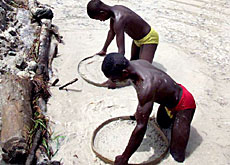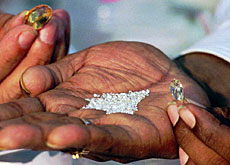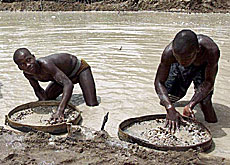Nations impose deadline for “blood diamond” pact

A new global certification system designed to curb the trade in so-called "blood diamonds" will come into force at the end of July.
Switzerland, along with around 70 other countries, agreed to a final extension to the deal at a meeting in South Africa.
Countries that fail to implement the new certification system for uncut diamonds will be excluded from international trade.
Switzerland was one of 56 countries that signed up to the Kimberley Process in Interlaken last November, setting in motion an improved process for tracking diamonds to ensure they are not used to fund conflicts.
So-called conflict diamonds are estimated to account for about three per cent of the annual global diamond trade, which is worth about $7 billion a year.
Now enlarged to 70 countries, the group had been reviewing the effectiveness of the pact and considering where improvements could be made.
One point of discussion in Johannesburg was the delay by some countries in implementing the certification system and whether to introduce tougher penalties for those that continue to lag behind.
Swiss delegate Roland Vock, head of export control policy and sanctions at the State Secretariat for Economic Affairs (Seco), said earlier that a closer look was needed at why some countries are failing to comply fully.
“Not all the countries involved in the Interlaken deal are meeting their obligations,” he said.
“We need to look at why legal texts have not been implemented and why certificates have not been printed.”
Human rights groups also want stricter penalties imposed on countries that fail to implement a new certification system for uncut diamonds.
Tougher punishment
Abbey Chikane, the South African chairman of the group, had earlier said delegates would have to consider whether stricter punishment should be introduced, adding that the April deadline should not be renewed.
The main reason for the delay in some countries is the time – about eight weeks – it takes to print certificates that cannot be forged.
The November agreement followed a damning report by the United Nations, which revealed that diamonds sold by countries including Angola, Sierra Leone and the Democratic Republic of Congo, were funding weapons purchases.
In 2000, the UN criticised the Swiss for importing diamonds from war-torn Angola and Sierra Leone, and declaring them Swiss. Switzerland responded by tightening controls at Geneva and Zurich airports.
Until 2001, Switzerland was the third most important diamond trading centre after London and Antwerp; however, business melted away after the world’s biggest gem firm, De Beers, relocated to London.
Not tough enough
Although the UN welcomed the Kimberley Process, human rights groups claim it does not do enough to ensure signatories comply with the terms of the agreement.
In particular, there is concern over the lack of an independent body to monitor the certification process in each country.
Instead, national governments are responsible for ensuring the diamonds are correctly processed, although they must comply with minimum international standards.
Danièle Gosteli, responsible for economics and human rights at Amnesty International’s Swiss section, says the absence of an independent monitor means the system is open to abuse.
“We can’t just rely on the declarations of governments, some of which are corrupt,” said Gosteli. “The certificates could be falsified.”
Vock says the concerns raised by the human rights groups will be looked into before the next meeting, likely to take place this autumn.
swissinfo with agencies
The Kimberley Process obliges each signatory state to ensure that each exported uncut diamond carries certification.
The certificate must state the origin, weight and value in dollars of the diamond.
It must also state the identities of the importer and the exporter, the date the diamonds were shipped and carry an official stamp.
The Kimberly Process was created to prevent diamonds from being sold by countries to fund wars.
So-called conflict diamonds are estimated to account for about three per cent of the annual global diamond trade, which is worth about $7 billion a year.
From next month, countries that don’t comply with the agreement may be punished with sanctions and excluded from the international uncut diamond trade.
But human rights groups say the penalties are not strong enough and have criticised the lack of an independent monitor to ensure each nation is correctly certifying its diamonds.

In compliance with the JTI standards
More: SWI swissinfo.ch certified by the Journalism Trust Initiative


You can find an overview of ongoing debates with our journalists here. Please join us!
If you want to start a conversation about a topic raised in this article or want to report factual errors, email us at english@swissinfo.ch.